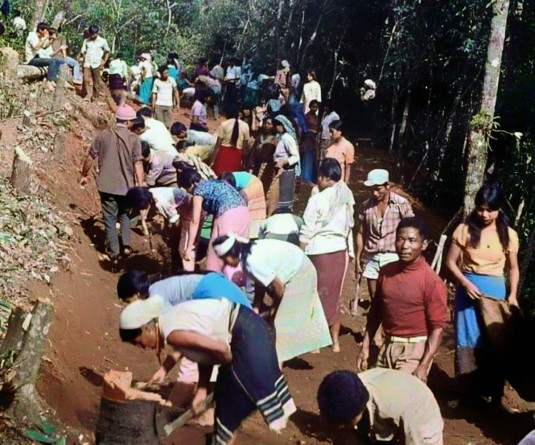
Our Correspondent
Kohima | March 5
Nagaland Information Commission (NIC) stands as one of the best performing Commissions in the country. The state has also one the lowest rates of rejection of RTI applications recorded in the country at 0.7% cumulative.
Till date, in the country, only Nagaland and Chhattisgarh have captured gender break-up of RTI applicants and records have shown that only 3% of the RTI applicants in Nagaland are female.
Besides Mizoram, Chhattisgarh and Maharashtra, Nagaland has also captured the economic profile of RTI applicants belonging to BPL category which stands at 0.27%.
This was stated by Bukchem Phom, Chief Information Commissioner (CIC), Nagaland during the celebration of “A decade of RTI in Nagaland” here at Capital Convention Centre.
Phom said in order to underscore the success, the Commission assigned Nagaland Voluntary Consumers’ Organization to undertake the study on how the RTI has impacted Nagaland. The Commission also conducted a quick audit on proactive disclosures which shows that some degree of discipline in the term of transparency has been restored in the functioning of government in the state.
“Out of the total number of 92 public authorities audited, two are reflected as highly transparent, 45 as reasonably transplant, 43 as limited transparency and 2 as poor level of transparency,” he said.
As transparency regulator in the state, the Commission has been conscientiously enforcing the Act in its entirety in letter and spirit, without fear and favor, Phom claimed adding that in order not to deny justice to RTI users by delaying justice, the Commission on its part disposes off second appeals and complaints expeditiously on regular basis maintaining the record of no pendency having conducted a total of 186 hearings in 5 years.
However, some cases which stands inquisitively as ‘pending’ have been caused by the deliberate failure on the part of PIOs and Appellate Authorities (respondent) and information seekers (appellant ) to comply with the decisions of the Commission making it difficult to close, he said.
As per the law, defaulting PIOs as well as deemed PIOs were penalized in 36 cases for not furnishing information to the seekers within the stipulated time.
The accumulated amount of penalties realized from such defaulting officers is Rs. 5, 70, 750. The total number of RTI applications received in various public authorities in ten years stands at 16,026.
Out of which the number of RTI applications received from 2006-07 to 2014-15 was the highest at the district level which recorded at 60% followed by the directorates at 25%, secretariat at 9% and other units at 7%.
The CIC said that the reported instance of some RTI uses being subjected to unwarranted harassment in the hands of certain village councils, the designated public authorities under this transparency Act, is a disturbing scenario.
While several PIOs and First Appellate Authorities are commendable for usually doing good job, some of them have miserably failed to take cognizance of RTI applications and first appeals, thus, not only denying the seekers of getting the materials at right stage but also burdening the Commission with second appeals for non-compliance.
Of all the appeals preferred to the Commission, Phom revealed that 69% are due to inaction or no action of the Appellate Authorities and 32% are due to unsatisfactory decision of the Appellate Authorities.
Guard against misuse of RTI Act: TR
Chief Minister TR Zeliang today stressed on the need to be on guard against misuse of the Right To Information (RTI) Act in the state.
“I have come to know that there have been instances of unscrupulous people misusing the provisions of RTI for extortion of money, or for harassment of public officials who do not toe their line,” he said while addressing the celebration of “A decade of RTI in Nagaland” here at Capital Convention Centre.
Zeliang said the Commission should be alert to such kind of misuse, and try to differentiate between the genuine information seekers, and those who misuse RTI provisions for personal benefits or for revenge.
He also stated that there were also instance where public authorities and PIOs are unnecessary harassed due to their ignorance of the RTI provisions.
“The RTI Act requires the public authorities to disclose or furnish that much of information which are available in the records of the department. They are not bound to furnish information which is not in the records of the government, and which is being maintained in the normal course of business,” he explained.
The chief minister said he came across some common RTI applications, which are being addressed to public authorities of many state governments and central government, trying to collect information in a certain format to suit their curiosity, or to suit the needs of their research papers or books.
In such a situation, Zeliang said, the PIO of the concerned department is not under obligation to do a special research for the applicant, or to manufacture a new document out of the various documents available with the government. The PIO is only required to furnish information or document which is available with the department.
“The purpose of the RTI Act would be better served if all government departments improve their record keeping and retrieval systems, so that all important information likely to be of interest to the citizens are kept in proper format, and they are included in the “standard disclosure” of the department,” he said.
Stating that the RTI Act, 2005 has been widely hailed as a landmark legislation, the chief minister said “its objective is to bring about transparency in all public offices, and thereby to reduce corruption.”
The other objective of the RTI Act is to empower the common people, by giving them the right to know what is going on in government’s offices and other public institutions.
The chief minister believed that the real purpose of RTI Act will be served when the working of the public offices are systematized, better system of record keeping and their retrieval are introduced, when there are more transparency in the decision making processes etc.
The chief minister also called out to all concerned to “put our heads together, so that the RTI Act will become a useful and effective instrument to our society and bring about good governance in Nagaland.”






